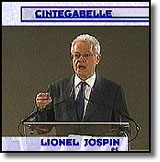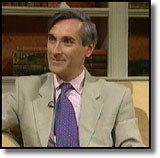
|
Blair Congratulates Socialist LeaderTony Blair was among the first world leaders to telephone French Socialist leader Lionel Jospin to congratulate him on his success in the French elections.The Prime Minister also confirmed to President Chirac the British Government's desire to continue working with the French. A Downing Street spokeswoman said: "The Prime Minister has spoken to both Mr Jospin to congratulate him on the result and to President Chirac to reaffirm our wish to continue our work with the French Government." She said that Mr Blair was quite likely to meet Mr Jospin in Malmo in Sweden on Thursday at a meeting of European socialists. "The Prime Minister is looking forward to seeing President Chirac in Paris on June 11," she added. The former Foreign Secretary Douglas Hurd said he hoped the new French government would maintain the strict criteria for a single currency, and would postpone the Euro if necessary. "If the result of all this is the postponement of the euro then that is a good thing for Europe," he said. "But if it is the postponement of the modernisation of France, turning your back on privatisation and free markets, then that is very bad news for France and indeed the rest of us." Speaking on BBC Radio 4's Today programme, he warned that relaxing the strict Maastricht criteria for monetary union could lead to Europe's currency becoming the "laughing stock for the world". Mr Hurd said he did not envisage Tony Blair forming an extremely close alliance with France's left-wing government.
"New Labour appears to have accepted the basic achievements of Mrs Thatcher and John Major in the economic field," he said. "They appear to have turned their back on the idea that you create jobs by higher public spending," he said. "The French socialists are still back in those old, discredited ways." The Tory leadership candidate John Redwood said in a statement: "The French election represents a decisive rejection of the single currency and monetary union." "The French people have said that expenditure cuts and mass unemployment are too great a price to pay for the dreams of an integrated Europe," said the Euro sceptic MP. "Chancellor Kohl and President Chirac will doubtless ignore these messages. They should be wise to understand that the peoples of western Europe want jobs and prosperity, not this damaging ideological commitment to a new centralised European government," he added.
German ConcernsIn Germany, Chancellor Kohl's government is watching closely and without doubt nervously for signs of fresh trouble from the direction of its closest European ally, France. Mr Kohl's cabinet could not have come this far in smoothing the way towards more European integration and to monetary union on the strict terms Germany wants without the staunch support of a centre-right French government, which has now been rejected by the voters. Leaders in France and Germany have been administering the highly unpopular medicine of tough spending cuts to their populations with the joint goal of joining the single currency. But the German Foreign Minister, Klaus Kinkel, said he was convinced the new government would continue to support Europe's planned monetary union and that Germany and France would remain partners. The German left welcomed the French Socialist victory. The leader of the opposition Social Democratic Party, Oskar Lafontaine, who hopes to mirror the results in Britain and France in Germany's own elections late next year, told Jospin his victory was "a great success for France and Europe." There was a similar reaction from the Italian left. Italy's centre-left Premier Romano Prodi said the French Socialists victory showed "a wave of reform" was sweeping Europe. For his part, the Dutch Premier Wim Kok, who will host the important EU summit in Amsterdam later this month, said he hoped to work closely with Jospin in promoting closer European integration. The two men have close ties forged during pan-European gatherings of socialist parties. |
Diana, Princess of Wales, 1961-1997
Conference 97
Devolution
The Archive
News |
Issues |
Background |
Parties |
Analysis |
TV/Radio/Web
Interactive |
Forum |
Live |
About This Site
News |
Issues |
Background |
Parties |
Analysis |
TV/Radio/Web
Interactive |
Forum |
Live |
About This Site
© BBC 1997 |
politics97@bbc.co.uk |

